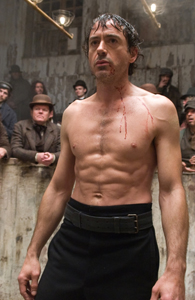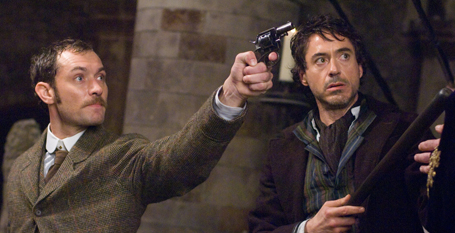
What does one make of this earthy, rowdy and rip-roaringly entertaining re-imagining of Sherlock Holmes? Sans deerstalker hat, crooked pipe, laconic wit and even his trademark “Elementary, my dear Watson”, what can we make of Guy Ritchie’s vision? Is Sherlock Holmes even Sherlock Holmes anymore?
Part of the problem lies in our forgetting that the television portrayals of the detective seem closer to Agatha Christie’s very mannered, very civilised Hercule Poirot than Sir Arthur Conan Doyle’s creation. The other part of the problem lies in our forgetting that the long Victorian era – as much as we (and the Victorians) wanted to believe in the progress of civilisation, English industry, and the march of science and rationality – gave birth to the Gothic and modern horror genres, Jack the Ripper, and Aleister Crowley.
Guy Ritchie’s Sherlock Holmes plays as though all previous mannered adaptations are the historically revisionist ones. In this laudable project, Ritchie stands in good company: a large part of Alan Moore’s creative output is set in an equally realistic, flesh and blood, warts and all Victorian England.
Not surprisingly, Sherlock Holmes even feels like part of the same universe as League of Extraordinary Gentlemen and From Hell. The plot involves a villain whose plan for world domination involves his resurrection from the dead, but like all detective stories, the chase is far more fascinating than the prize – Robert Downey Jr and Jude Law play their characters like a bickering couple from a romantic comedy, while the screenplay emphasises the “mad” and “maddening” bit of the mad genius that Doyle really wrote.
This is to say that there is a method in Guy Ritchie’s madness, one that melds the idea of “Sherlock Holmes” with wild Jackie Chan-style action, fistfights, explosions, sexual intrigue and the occult seamlessly and convincingly, right before our very eyes.
But it’s only elementary, my dear readers.












 列印版本
列印版本











讀者回應
Good!
He does come rather close at a few of points. Holmes says "Elementary" in 'The Crooked Man', and "It was very superficial, my dear Watson, I assure you" in 'The Cardboard Box'. He also says "Exactly, my dear Watson, in three different stories.
The phrase was first used by P. G. Wodehouse, in Psmith Journalist, 1915.
Quite disappointed that nothing "gay stuff" in the movie as suggested in the tabloids. :-(
請先登入再使用此功能。